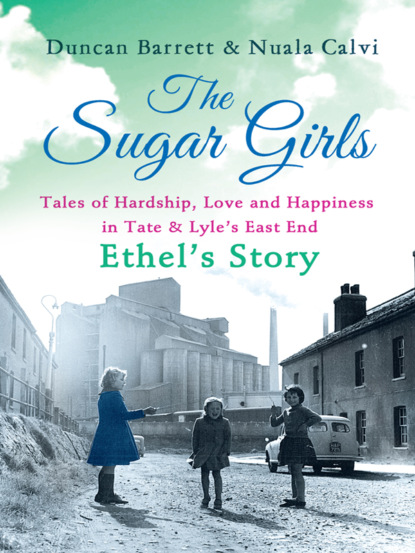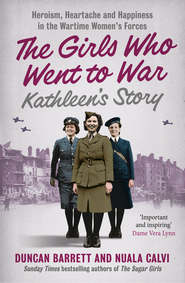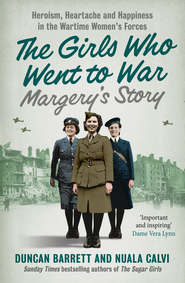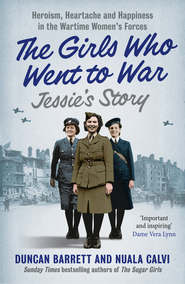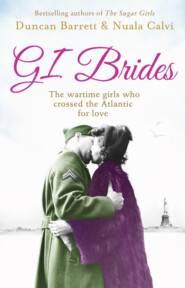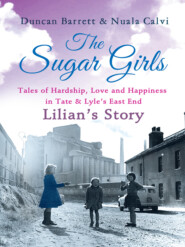По всем вопросам обращайтесь на: info@litportal.ru
(©) 2003-2024.
✖
The Sugar Girls – Ethel’s Story: Tales of Hardship, Love and Happiness in Tate & Lyle’s East End
Настройки чтения
Размер шрифта
Высота строк
Поля
She decided the best strategy was to bide her time. Dolly had no shortage of male attention and would hopefully tire of Archie’s before long. Meanwhile, Ethel made sure to remind him of her presence. At 14, Archie had already left school and was working at the Hollis Bros timber yard. Every day, Ethel was out on the front step when he walked past on his way home for dinner.
Soon enough, Archie’s interest in Dolly waned, and one day he asked Ethel if she fancied going to the pictures together at the Imperial cinema in Canning Town. She tried not to jump for joy as she accepted the invitation.
Being alone with Ethel seemed to have a sobering effect on Archie, and around her he kept his cheekiness in check, behaving like the perfect gentleman. That night he didn’t dare do more than sneak an arm around her, even in the dark of the picture house.
In fact, after several months of courting, Archie still hadn’t plucked up the courage to kiss her. One day they were walking to the park together and chatting, when one of Ethel’s friends spotted them from across the road. ‘Just do it, Arch!’ she shouted. ‘Go on!’
Archie froze like a rabbit caught in the headlights, but he knew it was now or never. While Ethel was still chatting away he suddenly turned, grabbed her and planted a great big smacker on her lips.
‘Archie!’ she chastised him, as soon as their lips unlocked, ‘I was in the middle of a sentence!’
But after that she let him kiss her whenever he liked. By the time Ethel joined Tate & Lyle, she and Archie were inseparable.
Phut … phut … phut …
Ethel and Joanie held their breath, along with the hundred or so other inhabitants of the factory shelter, as they listened to the distinctive splutter of the doodlebug. They willed the noise to continue, knowing that if the engine cut out it meant the warhead was about to fall.
The flying bombs, launched from occupied Europe, had become a regular feature of East End life ever since the D-Day landings the previous summer. But at least the doodlebugs, which flew like regular aircraft, provided enough warning to get civilians into shelters. Far more menacing were the V2 rockets, which travelled so fast – at four times the speed of sound – that the explosion was the first anybody knew of them. The shock wave alone was enough to kill unsuspecting victims far from the point of impact, and in the aftermath of a V2 strike it was not uncommon to see a normal-looking bus full of passengers, apparently sitting patiently in their seats but on closer inspection all quite dead.
At the height of the V2 menace the Royal Docks were sustaining a strike every two or three days, but Tate & Lyle’s two factories escaped a single direct hit. Plaistow Wharf had suffered its fair share of battering earlier in the war, with 54 incendiary bombs landing inside the factory, all but one of which were quickly extinguished. There was only one fatality, a Mr Kinnison who ran into an exploding bomb on his way to a shelter. Downriver, the Thames Refinery was also hit many times, but only two minor casualties were reported.
Various rumours had sprung up to explain the firm’s apparent lucky streak. At the Thames Refinery, the most popular theory was that their iconic chimney – the tallest in the area – provided such a good landmark for the docks that the Luftwaffe were reluctant to damage it. At Plaistow Wharf, the story went that the mysterious Hesser company had begged Hitler not to damage their precious packing machines.
Fortunately for Ethel, Tate & Lyle’s good luck continued to hold out, and the splutter of the doodlebug finally began to recede into the distance. The inhabitants of the shelter were able to relax, and Ethel let out a sigh of relief.
Moments later the all-clear siren began to sound, and the men and women around her were suddenly getting to their feet.
‘Back to work then,’ Joanie said cheerfully, munching on the last of her cracker and brushing a few stray crumbs from her lap onto the floor. Ethel followed as they made their way back up the black iron stairs.
On the Hesser Floor, Joanie retreated up to the office, while Ethel returned to her machine, determined to perfect her packing technique. But a friendship had already been forged. Before they left work that day, the two young women had arranged to go to the pictures together.
To begin with, the rigours of her new job took their toll on Ethel. At the end of each day her hair was grey with sugar dust and her clothes were stiff with it. Every night her wrists ached painfully from the twisting movement that she had to repeat over and over again packing hundreds of sugar bags. At work, when it got really bad, she would be sent to the factory surgery, where a nurse would rub ointment on her wrists and bandage them up temporarily, before sending her straight back to the Hesser Floor. But as time went on her muscles grew accustomed to the exertions, and she found herself growing stronger and more robust.
While the work of a sugar girl was building up the muscles in Ethel’s body, her mind soon got some exercise as well. The packers had to tally up the number of sugar bags that had been packed each day and display the result on a board at the base of each machine. Ethel had always been good at maths in school and had no problem with this, but she noticed that a girl on the next machine was struggling. Before long she was doing the other girl’s tally as well as her own.
Her efforts did not go unnoticed up in the office, where the forelady Ivy Batchelor stood gazing out through the glass window over her Hesser girls. Soon she had invited Ethel up to the office to try her out on a new job, calculating the overall tonnage of the entire department. Ethel was delighted, especially since it meant working with Joanie and the other office girls. She hadn’t made any friends on the factory floor and spent most lunchtimes eating a sandwich in the cloakroom on her own while the others all went to the canteen.
Louise Alleyne could not have been more proud of her daughter’s promotion, especially since Gladys Rawlins, from Ethel’s group of friends at home, had now also joined Tate & Lyle and was not progressing beyond sweeping the floor. When Ethel informed her mother of her friend’s dead-end job, she responded in no uncertain terms, ‘They put you on a broom, you come straight home. No girl of mine’s going to sweep floors for the rest of her life.’
The words stuck in Ethel’s mind, making her all the more determined to distinguish herself at work and win her mother’s approval.
As the war moved into its final months, trips to the factory shelters grew increasingly rare. At eight p.m. on 8 May 1945 the voice of company telephonist Nellie Franks was heard over the loudspeaker system announcing that Victory in Europe had been declared. Production was shutting down immediately, and it was time to down tools and begin the party.
Most of the workers congregated in the Recreation Room, where the celebrations were soon underway, carrying on until well after midnight. Outside the factory gates, the locals had lit a huge bonfire made from railway palings and were dancing around it. Even the refinery director, Oliver Lyle, was spotted enjoying a quick jig with them on his way home.
Few parts of the country had as much reason to celebrate the end of the war as the East End, and the area lived up to its reputation for enjoying a good knees-up. Flags and bunting from the King’s coronation nine years earlier were scavenged from old cupboards and strung up all over the houses, effigies of Hitler and his generals hung from the lamp-posts, and more bonfires sprung up in the war-damaged streets, those same East Enders who had fought the blazes caused by the Luftwaffe now raiding telephone kiosks for directories to keep the fires burning. Some enthusiastic souls let off fireworks they had been storing for six years, although the explosions, however beautiful, weren’t universally popular among the battle-weary population.
While some grateful Christians hastened to church as soon as they heard the news, the majority of people hit the local pubs, where the sawdust was trampled underfoot more furiously than ever before. The amount of alcohol consumed was prodigious, and before long the drunkenness had spread to every street. Any pianos that had survived the bombing were dragged outside, along with accordions and radiograms, to provide the soundtrack to a party on a scale never seen before, and the locals sang and danced into the early hours of the morning.
Вы ознакомились с фрагментом книги.
Приобретайте полный текст книги у нашего партнера:
Приобретайте полный текст книги у нашего партнера:





